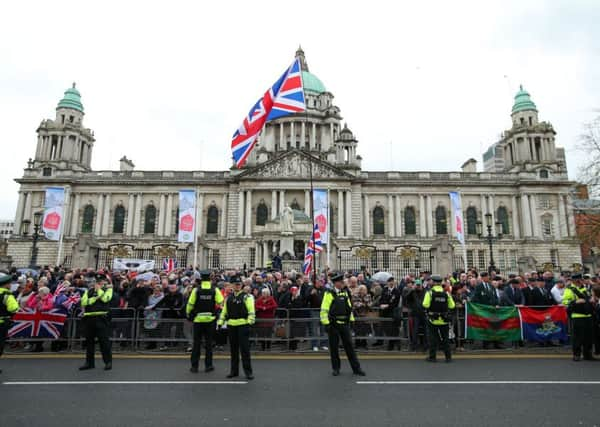Ben Lowry: A back-door amnesty could create the worst of all worlds


This, if it happened, would come about obliquely, via a Statute of Limitations.
The political push for such a statute at Westminster is aimed at protecting veterans from prosecution. The DUP MPs who support it are confident it can be restricted to ex security force personnel, but many legal experts think that it would have to apply across the board.
Advertisement
Hide AdAdvertisement
Hide AdThe main push for such a statute is Conservative MPs, who will not tolerate trials of elderly soldiers, and are probably not much interested in the consequences that might flow from stopping them.
It is not hard to understand the anger there is on this matter. If elderly soldiers are tried late in life for disputed single shooting incidents 45 years ago, then in a just world a determined effort would be made to bring to justice IRA leaders who orchestrated murder and mayhem, yet for whatever reason escaped the Troubles largely unscathed.
We all know this will not happen. Or if it did, the mere arrest of IRA leaders would lead to an outcry.
So the question remains: how is that soldiers now face trial?
Advertisement
Hide AdAdvertisement
Hide AdIn London today, veterans will again march against the unbalanced way in which legacy is panning out in Northern Ireland.
I hold to my view that this is one of the biggest scandals since the Second World War: that significant UK taxpayer funds are turned by the British state against itself in such circumstances.
A state that reacted with such restraint to a sustained campaign of IRA terror, a campaign that moved from indiscriminate bombings to targeted attacks on the security forces and judges, and then, when the security forces got better at protecting themselves, widened to people who supplied or worked for the security services (grievous crimes such as Patsy Gillespie and Teebane) and strayed into politicians, such as the lawyer Edgar Graham, and then when that failed moved to huge economic bombs in majority Protestant towns such as Coleraine and Bangor, and when that failed moved to economic targets in Great Britain.
Central to the retrospective distortion of events is the collusion lie, peddled by republicans and fuelled by a sweeping, entirely misleading use of the word collusion.
Advertisement
Hide AdAdvertisement
Hide AdThere were clearly instances of even the worst collusion, yet overall few IRA died despite being well known to the security forces (until the late 1980s, early 90s when there were some notable IRA deaths).
The real story of the Troubles is the many people who died at the hands of republicans because Britain so scrupulously adhered to the rule of law. Indeed, it is arguable that the UK failed in its duty to protect these victims from known fanatics (a failure under Article Two of the European Convention of Human Rights, which protects life, but an article which has been hijacked by apologists for IRA killers).
Like many people who have followed the legacy debate, I have wondered about the possible merits of an amnesty. Few people, for example, want to chase secondary illegal incidents of 20+ years ago.
The problem with an amnesty becomes stark when you think, for example, of granting such to culprits of massacres of civilians, as at the 1994 Loughinisland attack or La Mon, 40 years ago this month.
Advertisement
Hide AdAdvertisement
Hide AdThat would be ceasing to pursue people who deserve to be tried before an international court.
There is now a risk we will get things exactly the wrong way round: push ahead with processes that lead to a de facto amnesty, then establish legacy structures that have an inherent anti state bias. No-one gets prosecuted on any side but the IRA wins the narrative.
There needs to be a close examination of legacy to date: for example the situation in which 30% of PSNI legacy investigations are into state killings when the state was behind 10% of all Troubles deaths.
It would be good for republicans if even 10% of investigative resources were spent on state killings, because it would imply that security force killings were illegitimate.
Advertisement
Hide AdAdvertisement
Hide AdThe scale of the legacy challenge is evident in how the News Letter has again been almost the only media outlet to ask certain questions (see links below).
As Jeff Dudgeon and Owen Polley pointed out on these pages, there has been woefully little scrutiny of last Friday’s Loughinisland ruling outside of this newspaper.
If a court had issued such withering words on members of the security forces, republicans would have had no difficulty in making it transatlantic news.
• Ben Lowry (@BenLowry2) is News Letter deputy editor
Advertisement
Hide AdAdvertisement
Hide Ad